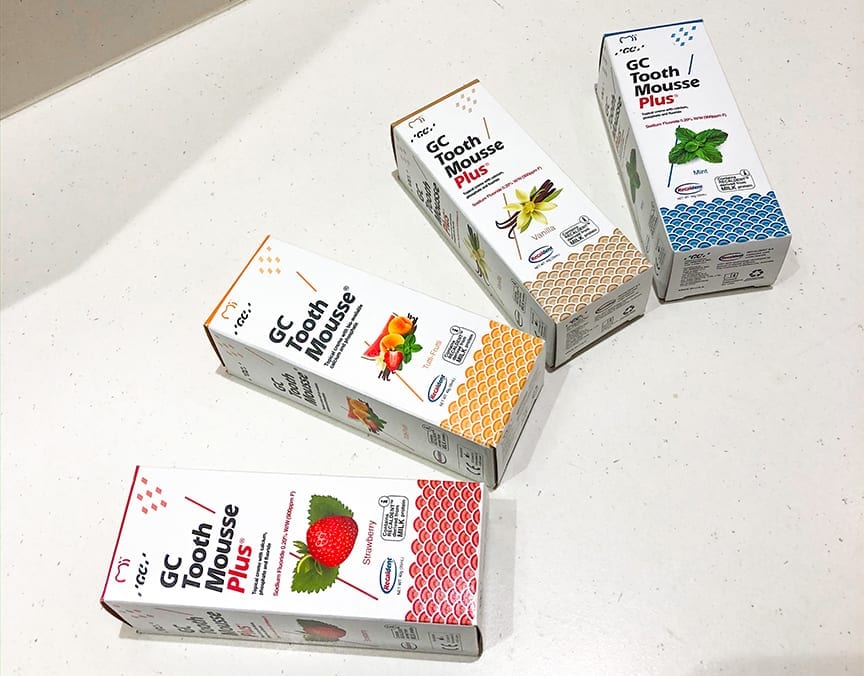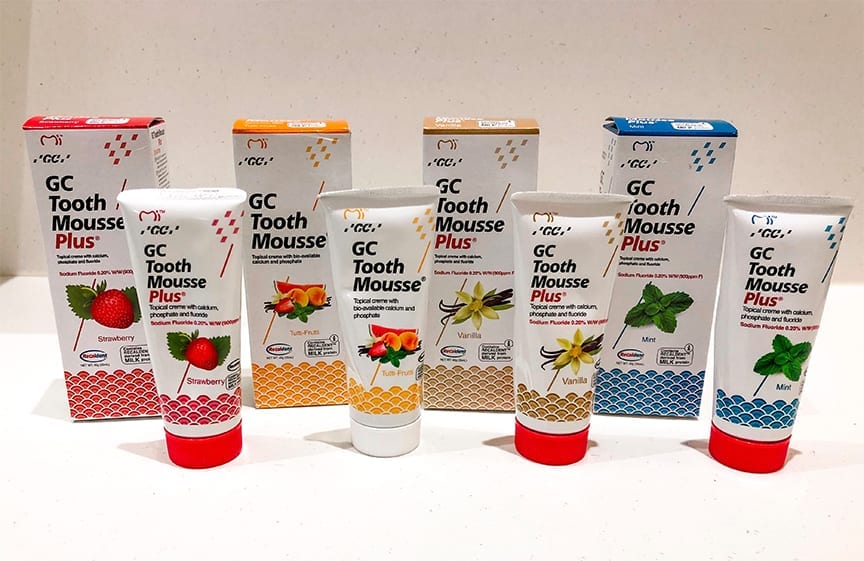Tooth Mousse is a topical oral health product that was developed at the Melbourne Dental School, University of Melbourne.
Tooth Mousse comes in the form of a foamy crème, and is available in a range of flavours including: Melon, Strawberry, Tutti-Frutti, Mint and Vanilla.
Tooth Mousse contains casein (a major milk protein), as well as calcium and phosphate. Calcium and phosphate are the major minerals that teeth are made from.
Tooth Mousse is available in two product options: with or without fluoride. The general Tooth Mousse product does not contain fluoride, whereas Tooth Mousse Plus does contain fluoride.
Tooth Mousse is not toothpaste. It is made of milk products so swallowing the product is safe and it can be used throughout the day.
What does Tooth Mousse do?
Tooth Mousse has been shown to remineralise decayed teeth by replenishing lost calcium and phosphate, and restore subsurface areas of defect in teeth enamel.
In addition, Tooth Mousse may help to:
- Relieve teeth sensitivity.
- Protect teeth from dental decay.
- Buffer dental plaque acid from bacteria in the mouth (help neutralise an acidic environment).
- Protect teeth from acidic food and drinks.
- Repair tooth damage in the early stages of decay.
- Prevent tooth erosion (*to some extent).
- Treat dry mouth syndrome (*to some extent).
Why use Tooth Mousse?
One of the main reasons people use Tooth Mousse is to restore mineral balance in the oral environment.
Advantages of Tooth Mousse include:
- Help reduce teeth sensitivity. For cases where cold drinks produce extreme sensitivity, or there is some evidence of gum recession.
- It can be used after Teeth Whitening procedures to help minimise teeth sensitivity.
- It can be of great benefit to patients undergoing orthodontic treatments (wearing braces) as it can help to reduce tooth decay around dental brackets.
- Provide another method of protection to teeth against decay. Whilst fluoride helps to protect the outside of the tooth to make it strong, Tooth Mousse soaks inside the tooth to help remineralise it by providing additional calcium and phosphate.

Dental concerns Tooth Mousse can help with:
Teeth sensitivity
Sensitivity is usually caused by exposure of the second layer of tooth, the dentine, at the neck of the tooth. Sensitivity tends to occur when the diet is acidic, or the saliva is not as good as it should be. Tooth Mousse provides calcium and phosphate ions to seal off the exposed dentine.
Dental decay
Decay is caused by a number of bacteria in our mouth feeding on sugars (from food and drink) for energy, and creating acid as a by-product. Therefore, we need to consider all of the following advice in the context of developing a healthy diet with good brushing and flossing techniques.
The early stages of decay (before a hole develops) can be healed if the causes of decay are reversed. Traditionally we have used fluoride in the water and toothpaste to help reduce decay, however the work of fluoride is limited. This is where Tooth Mousse is useful. The calcium and phosphate, with the help of fluoride, replace the lost mineral from the early decay, and help restore the enamel that was once there.
Enamel erosion
Tooth Mousse can also be used by those suffering from morning sickness and reflux. Because the acid from your stomach can dissolve your teeth, rubbing Tooth Mousse on your teeth after morning sickness/reflux will help to protect your teeth from erosion.
However, if morning sickness is quite severe, using the product before the sickness occurs should be even more effective, as it can directly protect the tooth surface.
In the case of morning sickness, you should not brush your teeth straight after vomiting. This is because the acid will have weakened your teeth enamel and the action of brushing can cause damage by wearing away the demineralised enamel and dentine. Instead, you should rinse your mouth out with water or milk, and then apply Tooth Mousse.
Dry mouth
Tooth Mousse can also be used to help treat dry mouth. If you have dry mouth, you don’t have much saliva buffering your teeth enamel from acids, and so Tooth Mousse can offer your teeth more protection against dental decay. However, as the Tooth Mousse is quite thick, adding a little water to your mouth after rubbing it around will help it be more effective.
When to use Tooth Mousse
To help prevent teeth sensitivity, Tooth Mousse can be used before dental procedures such as teeth whitening. It can also be used after dental procedures such as teeth whitening, professional cleaning and periodontal care.
Tooth Mousse can also be used whilst having orthodontic treatment to prevent white spots from appearing on your teeth and to help reduce tooth decay around dental brackets.
Patients may also like to incorporate Tooth Mousse into their general oral care routine.
How to use Tooth Mousse
We recommend that Tooth Mousse is applied at night, after you have brushed and flossed your teeth.
Use a clean finger, a cotton bud or your toothbrush to smear a small pea-sized amount onto your teeth.
Tooth Mousse is not toothpaste. It is made of milk products so swallowing the product is safe and it can be used throughout the day.
However, because Tooth Mousse is derived from milk protein (casein) it is not suitable for people who have a suspected or proven allergy to milk proteins.
Where can I get Tooth Mousse?
VC Dental stocks Tooth Mousse in a variety of flavours. You are able to purchase it at our reception counter.
This information is intended to provide patients with a general overview of the tooth mousse product. We recommend you check directly with the manufacturer or a qualified medical professional if you are unsure if it is suitable for you.


